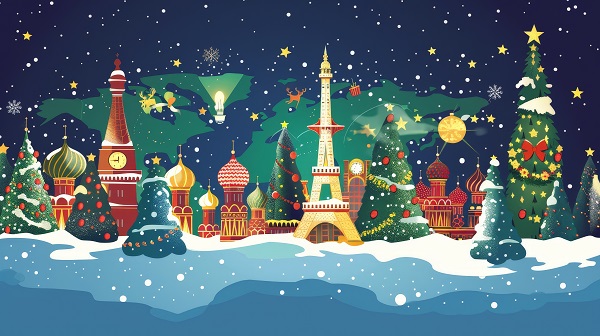Christmas Around the World: How Different Cultures Celebrate

Dive into the rich tapestry of Christmas traditions observed worldwide, showcasing a wide array of customs and practices. Different cultures celebrate the festive season in unique ways, ranging from familiar traditions to more unconventional rituals.
Each country's approach to Christmas offers insights into the diverse ways in which the holiday is commemorated globally. From ancient customs to contemporary interpretations, the global celebration of Christmas reflects a variety of cultural influences and historical backgrounds.
Unique Christmas Traditions Globally
Christmas traditions vary significantly across cultures, highlighting diverse customs and practices worldwide. In Japan, it's common to enjoy KFC meals during the holiday season, a tradition that has become popular over the years.
In Poland, families partake in the tradition of sharing Oplatek, a thin, unleavened wafer, as a symbol of forgiveness and unity. In Slovakia, it's customary for families to prepare carp for Christmas Eve dinner after letting the fish live in the bathtub, symbolizing prosperity and good luck for the coming year.
In Sweden, St. Lucia's Day is celebrated with candlelit processions where the eldest girl dresses as St. Lucia, accompanied by others, enjoying special buns and beverages. Greece also has unique traditions, such as decorating trees and boats for Christmas, with cities like Athens honoring seafarers by lighting up boats as part of the festive decorations.
These international holiday rituals offer a glimpse into the rich cultural diversity and unique practices that shape the Christmas festivities around the world. Each tradition holds historical and symbolic significance, reflecting the values and beliefs of different societies during this festive season.
And don’t forget to check out DaysUntil.io to find out how many days are left until Christmas.
Varied Celebrations Across Cultures
Examining Christmas celebrations globally reveals a diverse range of customs and festivities that represent the essence of the season across different cultures. Christmas is observed worldwide with distinct traditions that showcase the cultural richness of various countries.
-
In Mexico, the holiday season commences in early December with homage to the Virgin of Guadalupe and the customary reenactment of Las Posadas.
-
Australians mark Christmas in the midst of summer, amidst high temperatures and coinciding with the summer break for children.
-
France observes Noel, which translates to "the good news," by burning a yule log from Christmas Eve until New Year's Day to symbolize good fortune for the upcoming year's harvest.
Cultural Practices in Different Countries
Across the globe, Christmas celebrations vary significantly, with each country showcasing distinct cultural practices that contribute to the holiday season. In Mexico, the Christmas period commences with honoring the Virgin of Guadalupe and the observance of Las Posadas. England is credited with introducing the tradition of exchanging Christmas cards and popularizing caroling. In Australia, where Christmas coincides with the summer season, children relish their summer break during this festive time. France marks Christmas, referred to as Noel, by burning a yule log for good fortune. Germany has a rich history of adorning Christmas trees during the winter solstice, a custom that was adopted by American households through German immigrants. These diverse cultural traditions across different countries collectively enhance the global celebration of Christmas.
Diverse Global Christmas Customs
Numerous countries have distinct Christmas customs that contribute to the festive atmosphere of the season.
-
In Japan, a notable Christmas tradition involves consuming Kentucky Fried Chicken as a popular meal choice, stemming from a successful marketing campaign by the fast-food chain.
-
Slovakian families partake in a unique practice where they keep a live carp in their bathtub before cooking it for the traditional Christmas Eve dinner.
-
Sweden observes St. Lucia's Day with candlelit processions, where the eldest girl dresses as St. Lucia and participants enjoy special Lucia buns and beverages.
These varied customs from different parts of the world highlight the cultural diversity and richness of Christmas celebrations globally.
Significance of Christmas Celebrations
The cultural and traditional significance of Christmas celebrations worldwide stems from a diverse array of customs and rituals observed in different countries. These traditions vary widely, highlighting the importance of recognizing and respecting cultural practices during the holiday season. Each nation has its unique way of commemorating Christmas, incorporating specific rituals and symbols that contribute to the global observance of this festive time.
Understanding the various cultural expressions of Christmas enhances our awareness of the diverse range of traditions and customs globally. Additionally, it underscores the common themes of joy, goodwill, and community that unite individuals across cultural and linguistic boundaries during this period.
Conclusion
Having explored the various Christmas traditions observed in different countries, it is evident that each culture contributes unique customs and practices to the holiday season. From Japan's illumination events to Sweden's St. Lucia Day celebrations, the global diversity of Christmas festivities is a testament to the richness of cultural heritage worldwide. By embracing and understanding these varied traditions, individuals can enhance their appreciation for the global significance of Christmas. Observing and respecting the customs of different cultures can add depth and meaning to one's own holiday celebrations.














